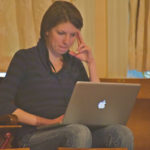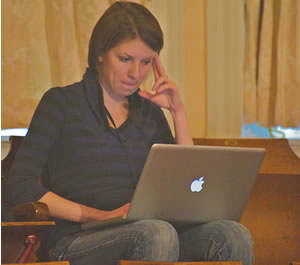
Wikipedia enthusiasts may have a new way to argue their case to professors skeptical of the online encyclopedia: Cancer researchers said in June that Wikipedia was nearly as accurate as a well-respected, peer-reviewed database, although the wiki entries were a bit more boring.
Yaacov Lawrence, an assistant professor in Thomas Jefferson University’s Department of Radiation Oncology in Philadelphia, examined 10 types of cancer and compared Wikipedia’s information to statistics in the National Cancer Institute’s Physician Data Query, a peer-reviewed oncology database.
About 2 percent of the information from both web-based resources differed from textbook sources, Lawrence found. Lawrence used algorithms to judge the readability of each cancer entry, and based on word length and sentence length, the Wikipedia entries were much more difficult to comprehend.
He discussed his findings at the American Society of Clinical Oncology’s annual meeting in Chicago, which ran from June 4-8.
“The accuracy [of Wikipedia] was good, but I think that there is more to a good encyclopedia than accuracy,” Lawrence said in an interview with eCampus News. “There is depth of coverage, readability, understanding, [and] engagement. We found that Wikipedia was better at discussing hard-known facts, but poor at discussing controversial issues.”
For an online treasure trove of 3.3 million articles, almost 21 million pages, and 12.7 million registered users, examining 10 cancer-related entries for a research project doesn’t mean Wikipedia–a site that lets anyone with an account and a web connection edit text–is comparable to data compiled and reviewed by professionals in a scientific field, Lawrence said.
“There needs to be a much larger survey done because if 1 percent of [Wikipedia] articles are severely flawed,” the Thomas Jefferson University research would probably not find those inaccuracies, he said. “Every source of academic information is subject to bias and requires verification.”
Starting last fall, entries written by new Wikipedia users must be edited by regular contributors, and changes to the biographies of celebrities or controversial figures will be reviewed before they go live on the site, said Erik Moeller, deputy director of the Wikimedia Foundation, adding in a blog post that “false information can do the most serious harm to an individual.”
The policy shift came after years of criticism by many in academia who saw the anonymity of Wikipedia contributors as a drawback for serious research.
Like many educators, Raymond MacDermott, an associate professor of economics at Virginia Military Institute in Lexington, Va., said Wikipedia is a good “starting point” for students delving into an unfamiliar topic, but the vast encyclopedia shouldn’t be the only resource a student cites in a research paper.
“I don’t dock points for students who use Wikipedia, but I might ridicule them for it,” MacDermott said. “Students still need to take [Wikipedia] with a grain or salt.”
MacDermott tells his students to examine sources cited in Wikipedia entries that are listed at the bottom of each page.
For instance, Wikipedia’s entry on the internet includes “notes” that include “world internet usage” and references such as the Media Freedom Internet Cookbook. The entry also includes a link to the history of the internet at the bottom of the web page.
“Those sources usually have more accurate information,” MacDermott said.
MacDermott said he has used Wikipedia for personal and professional queries and found some entries filled with complex lingo catering to experts on a subject, not everyday readers.
“It’s not written at a very readable level. … I think it would be more useful to everybody if it was written in more plain English,” he said, adding that a Wikipedia writer’s inability to use concise sentences and simple words should make college students skeptical of the resource. “[The Wikipedia writer] might find a resource that has great information, but since they don’t really know what they’re talking about, they struggle and make it difficult to read.”
Research published in March in the journal First Monday showed that eight out of 10 students surveyed said they used Wikipedia for background knowledge. Fifty-two percent of respondents said they frequently used the web-based collaborative encyclopedia, “even if an instructor advised against it.”
Twenty-two percent said they rarely or never used the site. Only 17 percent of student respondents said they used Wikipedia because it was more reliable than other web sites.
About 2,300 students responded to the survey, according to the First Monday web site.
“Students reported they could not begin their research process until they had an idea of what they were going to write about,” the study said. “They did not think that they could approach an instructor about an assignment, until they knew more about their topic. They did not use a scholarly research database early on, given the specificity of academic journal content.”
- Research: Social media has negative impact on academic performance - April 2, 2020
- Number 1: Social media has negative impact on academic performance - December 31, 2014
- 6 reasons campus networks must change - September 30, 2014
